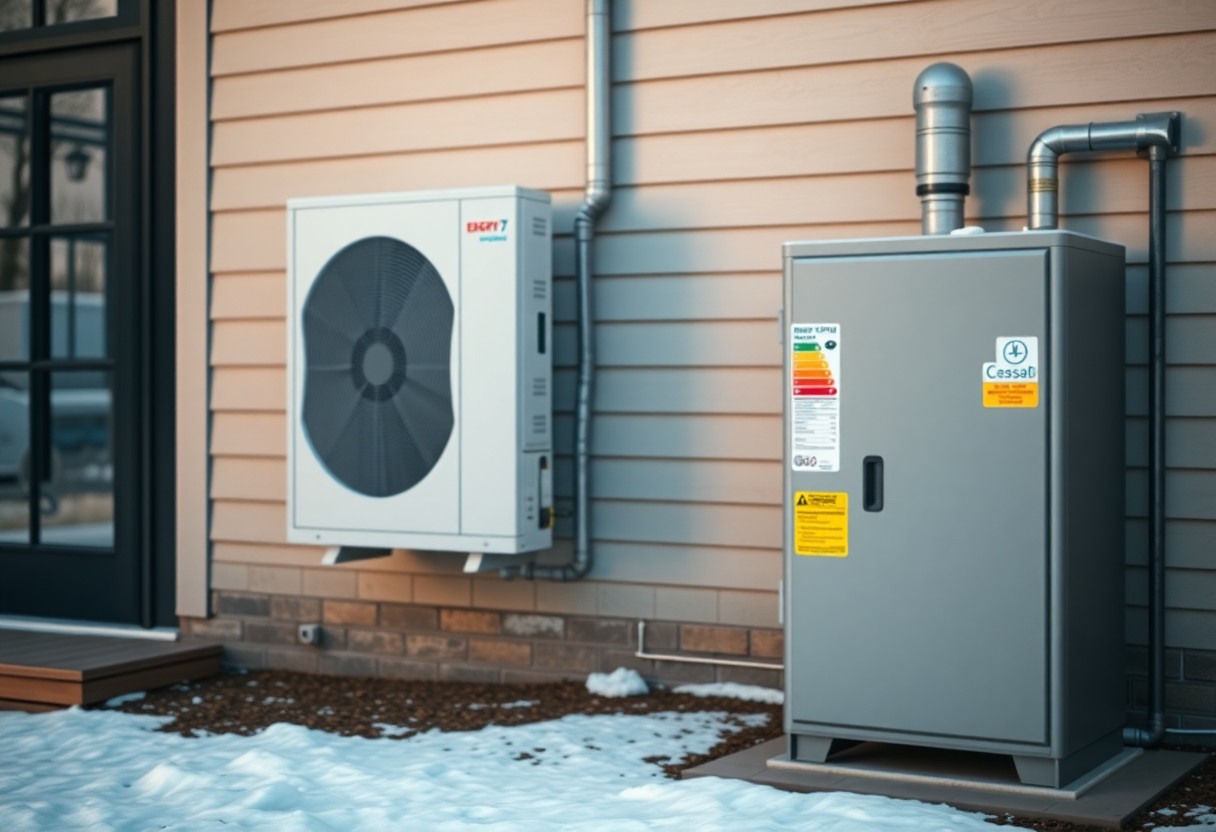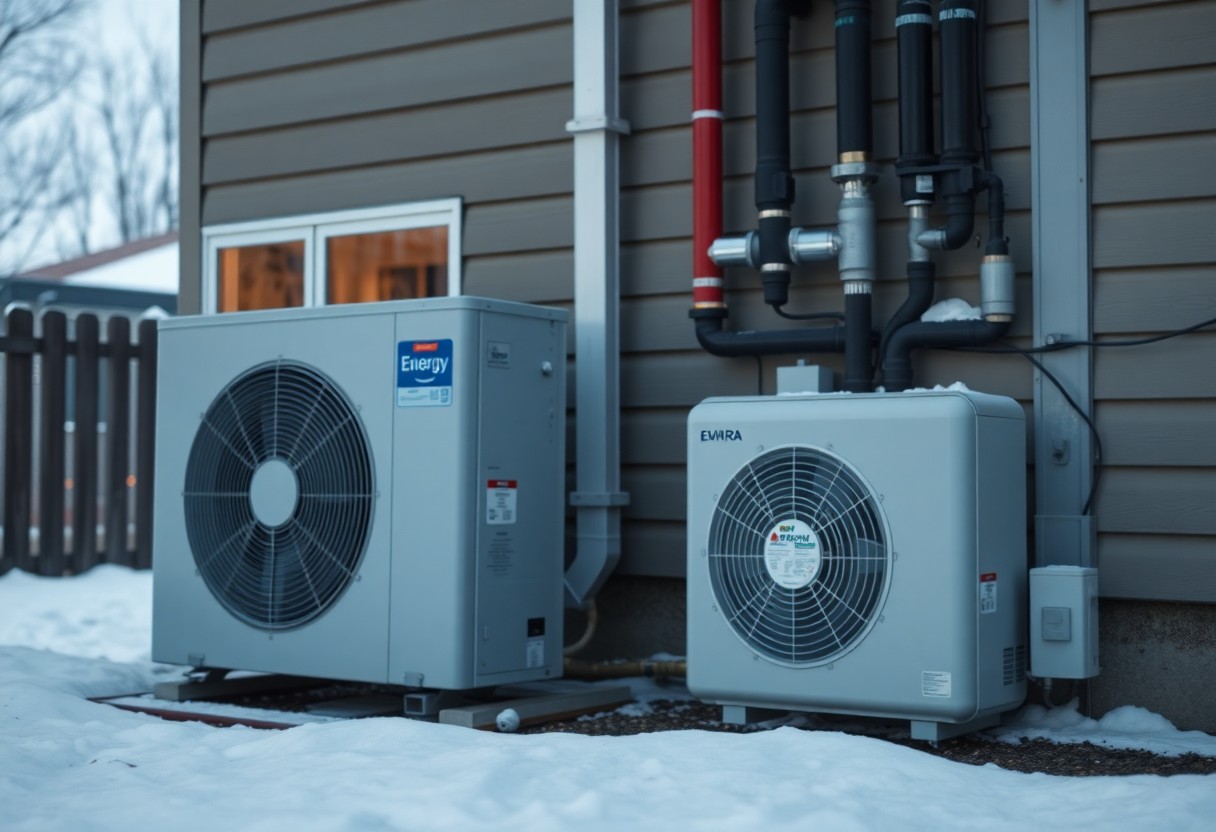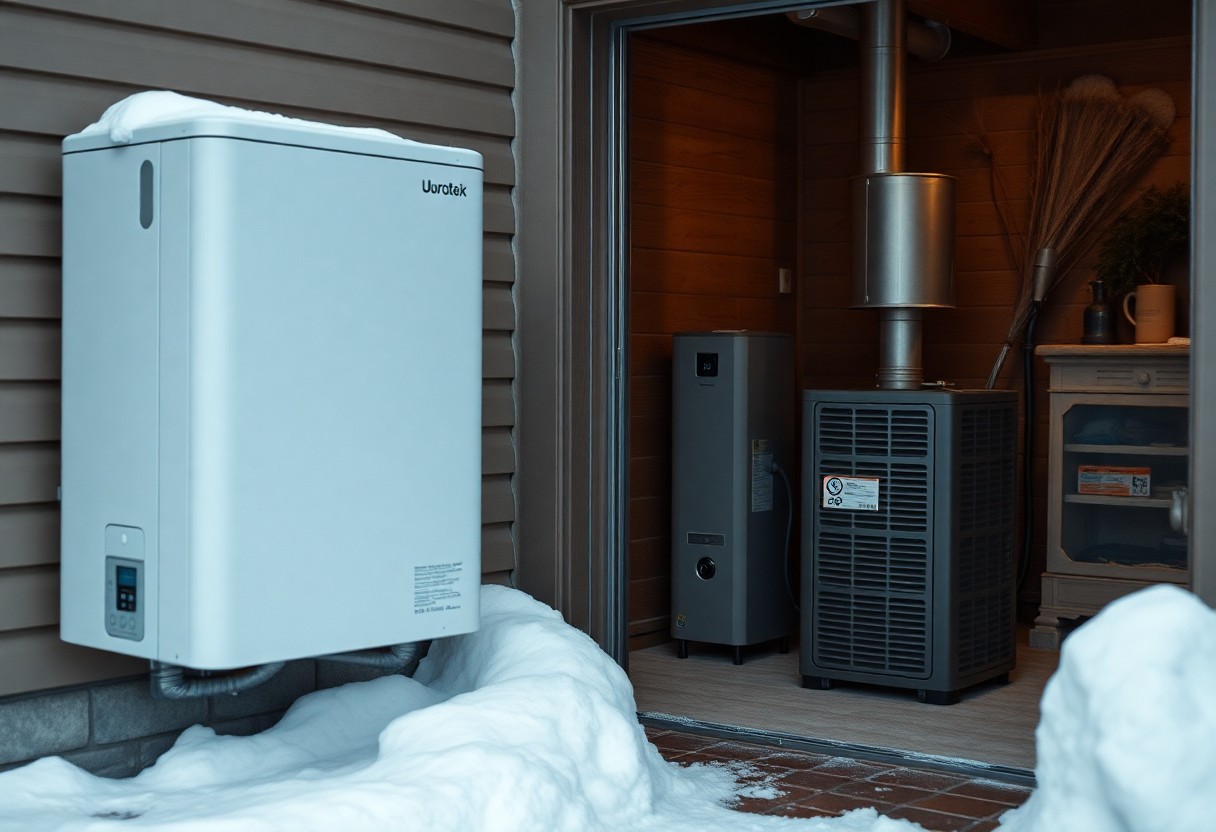Heat Pump vs Gas Heating for Winter Climate Efficiency
It’s important to understand the benefits and drawbacks of heat pump versus gas heating systems for your winter climate needs. Both options have their efficiencies and functionalities, and your choice can significantly impact your energy bills and comfort levels. This post will explore key differences, helping you make an informed decision to ensure your home stays warm and efficient throughout the colder months.

Key Takeaways:
- Heat pumps are generally more energy efficient than gas heating, especially in moderate winter climates.
- Heat pumps can provide both heating and cooling, offering year-round climate control.
- Gas heating may have lower upfront installation costs but can result in higher long-term fuel expenses.
- Heat pumps reduce carbon emissions, contributing to a more sustainable energy use.
- Performance of heat pumps decreases in extremely cold temperatures, while gas heating remains consistent.

The Energy Efficiency Showdown: Heat Pumps vs. Gas Heating
Evaluating Energy Consumption and Emissions
Heat pumps typically operate with greater energy efficiency, converting one unit of electricity into multiple units of heating. This can amount to a 300% efficiency rating, while gas heating systems generally operate at around 90% efficiency. Additionally, heat pumps produce lower greenhouse gas emissions, particularly in regions where the electricity grid incorporates renewable energy sources. In contrast, gas heating contributes directly to carbon emissions, making heat pumps a cleaner choice for environmentally-conscious homeowners.
Cost-Effectiveness Over Time
The long-term savings associated with heat pumps can outweigh initial installation costs, especially in climates where temperatures remain moderate in winter. Although gas heating systems may offer lower upfront costs, fluctuating fuel prices can lead to higher expenses over time. Additionally, heat pump maintenance is generally less intensive, translating to further savings.
Heat pumps, while initially more expensive to install—averaging between $7,000 to $12,000—tend to save you money in the long run due to lower operational costs. Energy Star estimates that heat pumps can save homeowners between $300 to $600 annually compared to gas heating, particularly over the lifecycle of the unit. With state and federal incentives for energy-efficient systems, ROI can significantly improve, making heat pumps a financially savvy option in the context of rising energy costs and climate priorities.
Performance in Harsh Conditions: A Comparative Analysis
| Heating Method | Performance in Harsh Conditions |
|---|---|
| Heat Pump | Efficient until about -5°F; may require supplementary heat. |
| Gas Heating | Consistent performance; effective in extremely low temperatures. |
Heat Pump Effectiveness in Extreme Cold
Heat pumps can struggle in temperatures below freezing, with efficiency significantly dropping around -5°F. At this point, they may need auxiliary heat sources to maintain comfort. Despite advancements, such as variable speed compressors that enhance performance, the overall heat output declines, making them less reliable in severe cold scenarios.
Gas Heating Reliability and Dual-Fuel Systems
Gas heating remains a reliable choice in extreme winter conditions, providing consistent warmth regardless of outdoor temperatures. Dual-fuel systems enhance this reliability by pairing heat pumps with gas furnaces, automatically switching to gas during particularly cold snaps to ensure uninterrupted heating and optimal efficiency.
Dual-fuel systems integrate the benefits of both heating methods, allowing you to capitalize on the energy efficiency of heat pumps during milder winter days while leveraging the power of gas heating in extreme temperatures. For instance, you can enjoy lower utility bills when the heat pump operates efficiently, yet have the peace of mind that your home remains warm and comfortable when temperatures plummet. This adaptability not only enhances comfort but also optimizes energy usage and reduces your carbon footprint.
Environmental Impact: Beyond the Utility Bill
Evaluating the environmental impact of heating systems goes beyond mere energy costs. Heat pumps typically have a lower carbon footprint than gas heating systems because they use electricity, which can be sourced from renewable energies. Conversely, gas heating releases direct emissions into the atmosphere. Understanding these differences can help you make an informed decision that aligns with both your comfort needs and environmental values.
The Carbon Footprint of Each System
The carbon footprint of your heating system significantly influences overall environmental health. While heat pumps emit no direct greenhouse gases, their total carbon emissions depend on the electricity source. In contrast, gas heating generates about 5.3 kg of CO2 for every cubic meter of natural gas burned, contributing directly to climate change. By considering your utility’s energy mix, you can better gauge your system’s overall impact.
Lifecycle Assessment: From Production to Disposal
A lifecycle assessment of heating systems provides insights into their environmental impacts at every stage. Heat pumps often have a longer lifespan than gas systems but require energy-intensive production processes. The disposal of heat pumps also entails challenges, particularly with refrigerants, while gas systems pose hazards during production and extraction phases. Thoroughly evaluating these factors helps reveal the long-term environmental cost of each heating option.
Delving deeper into lifecycle assessments, heat pumps typically last 15-20 years, outlasting many gas systems, which often have a lifespan of 10-15 years. The manufacturing of heat pumps involves substantial energy, particularly due to the production of compressors and other components. Moreover, issues arise during disposal, as improper handling of refrigerants can lead to potent greenhouse gas emissions. Gas systems, while initially less impactful in production, have their own complications tied to extraction methods like fracking, which can damage ecosystems. Evaluating these stages will enhance your understanding of the overall sustainability associated with your heating choice.
Installation and Maintenance: What You Need to Know
Understanding the installation and maintenance requirements of heating systems helps you make informed choices for winter efficiency. While heat pumps generally require professional installation and may need changes to existing ductwork, gas systems often need a gas line and venting for combustion gases. You should also consider local regulations which can affect the installation process and costs. Both systems require specific upkeep to ensure longevity and efficiency, making maintenance a key factor in your decision.
Initial Costs and Infrastructure Considerations
Initial costs vary significantly between heat pumps and gas heating systems. Heat pump installations can range from $3,000 to $8,000, depending on the model and necessary infrastructure changes. In contrast, gas heating typically falls between $2,500 and $7,000, influenced by the availability of gas lines and venting requirements. You should factor in potential alterations to your home’s existing infrastructure, which could impact the overall budget for either system.
Long-Term Maintenance and Operational Issues
Long-term maintenance costs can differ widely based on your choice of heating system. Heat pumps typically demand less frequent maintenance, focusing primarily on air filter changes and occasional refrigerant checks. Gas heating systems require more regular inspections for safety and efficiency, including checks for gas leaks and venting issues. Over time, you may find that the ongoing operational costs for gas heating rise, particularly with fluctuating fuel prices.
Focusing on long-term maintenance, heat pumps generally require professional servicing every few years, which can be less costly than the typical annual service needed for gas systems. Gas furnaces, meanwhile, might need annual checkups to ensure safe operation. Additionally, heat pumps operate more efficiently in moderate temperatures, leading to lower energy bills. However, in extreme cold, gas heating may prove more reliable and cost-effective, so it’s vital to consider your local climate and energy costs when evaluating long-term viability.
The Future of Home Heating: Trends and Innovations
Emerging technologies are reshaping how you approach home heating, emphasizing efficiency and sustainability. Innovations such as smart thermostats, advanced heat pump systems, and integrated renewable energy solutions illustrate a shift towards smarter, eco-friendly heating options. As you consider the future, expect variable energy pricing, decentralized energy systems, and intelligent grid connections to play significant roles in heating decisions, blending comfort with environmental responsibility.
Advances in Heat Pump Technology
Recent advancements in heat pump technology enhance both efficiency and performance, making them a more attractive option for winter heating. Innovations such as variable speed compressors and improved refrigerants allow heat pumps to operate effectively even in extremely low temperatures. Enhanced defrost cycles and smart control systems provide greater adaptability, ensuring your home stays warm while reducing energy consumption.
The Role of Renewable Energy in Gas Heating
Integrating renewable energy sources into gas heating systems is an innovative approach that improves sustainability. By supplementing conventional gas systems with solar or biomass energy, you can significantly reduce your carbon footprint while maintaining reliable heating. This hybrid approach makes use of cleaner energy options, promoting a more balanced and environmentally friendly energy consumption model.
Renewable energy integration in gas heating can take various forms, such as solar thermal systems that preheat water for use in gas boilers or biomass boilers that use renewable organic materials. For example, pairing a gas furnace with solar panels can substantially decrease greenhouse gas emissions, leveraging the sun’s energy to offset gas consumption. Many homeowners increasingly adopt these systems to align with energy efficiency goals, demonstrating a growing trend toward combining traditional and sustainable heating methods in your home.
Final Words
Summing up, when considering heat pump versus gas heating for winter climate efficiency, you should weigh the long-term savings and environmental impact against initial costs. Heat pumps offer higher efficiency and lower emissions in milder climates, while gas heating can provide reliable warmth in extremely cold conditions. Ultimately, your choice will depend on your specific climate, budget, and energy preferences. Assessing these factors will help you make an informed decision that best suits your heating needs and lifestyle.
FAQ
Q: What is a heat pump and how does it work in winter climates?
A: A heat pump uses external air or ground sources to extract heat and transfer it indoors. In winter, it works by absorbing heat from the outside air, even when temperatures are low, and moving it inside to warm the space efficiently.
Q: How does gas heating compare to heat pumps in terms of efficiency?
A: Gas heating typically has higher heat output compared to heat pumps in very cold conditions. However, heat pumps are generally more energy-efficient for moderate temperatures, converting more energy into heat than the energy consumed.
Q: What are the operating costs for heat pumps versus gas heating systems?
A: Operating costs for heat pumps can be lower than gas heating, especially in milder winter conditions. However, gas prices and the efficiency of individual systems can significantly affect overall costs, making the comparison dependent on local energy prices.
Q: Are heat pumps more environmentally friendly than gas heating?
A: Yes, heat pumps are often considered more environmentally friendly since they can utilize renewable energy sources and produce fewer greenhouse gas emissions compared to gas heating, which relies on fossil fuels.
Q: What are the maintenance requirements for heat pumps compared to gas heating?
A: Heat pumps generally require less maintenance than gas heating systems. However, both systems require regular inspections. Heat pumps may need more frequent checks on their filters and refrigerant levels while gas systems need regular checks for safety and efficiency.
